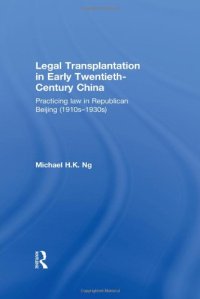
Ebook: Legal Transplantation in Early Twentieth-Century China: Practicing law in Republican Beijing
Author: Michael H. K. Ng
- Tags: China Asia History World Civilization Culture Expeditions Discoveries Jewish Religious Slavery Emancipation Women in Law Practice Office Education Marketing Advertising Technology Legal Services Paralegals Paralegalism Reference Research Test Preparation Almanacs Yearbooks Atlases Maps Careers Catalogs Directories Consumer Guides Dictionaries Thesauruses Encyclopedias Subject English as a Second Language Etiquette Foreign Study Genealogy Quotations Survival Emergency Preparedness Words Grammar W
- Series: 1910s-1930s
- Year: 2014
- Publisher: Routledge
- Language: English
- pdf
"Practicing law" has a dual meaning in this book. It refers to both the occupational practice of law and the practicing of transplanted laws and institutions to perfect them.
The book constitutes the first monographic work on the legal history of Republican Beijing, and provides an in-depth and comprehensive account of the practice of law in the city of Beijing during a period of social transformation. Drawing upon unprecedented research using archived records and other primary materials, it explores the problems encountered by Republican Beijing’s legal practitioners, including lawyers, policemen, judges and criminologists, in applying transplanted laws and legal institutions when they were inapplicable to, incompatible with, or inadequate for resolving everyday legal issues. These legal practitioners resolved the mismatch, the author argues, by quite sensibly assimilating certain imperial laws and customs and traditional legal practices into the daily routines of the recently imported legal institutions. Such efforts by indigenous legal practitioners were crucial in, and an integral part of, the making of legal transplantation in Republican Beijing.
This work not only makes significant contributions to scholarship on the legal history of modern China, but also offers insights into China’s quest for modernization in its first wave of legal globalization. It is thus of great value to legal historians, comparative legal scholars, specialists in Chinese law and China studies, and lawyers and law students with an interest in Chinese legal history.